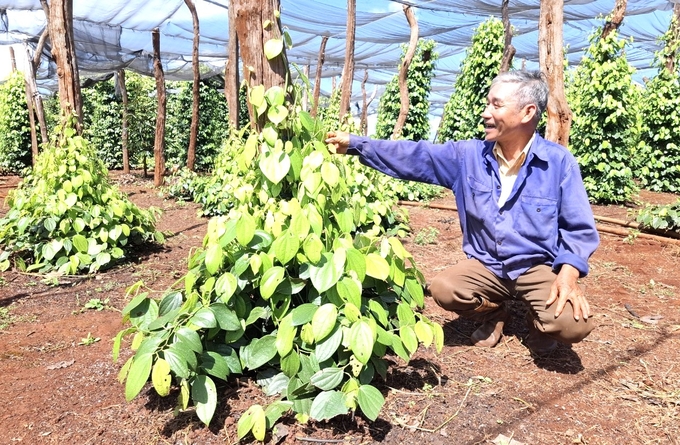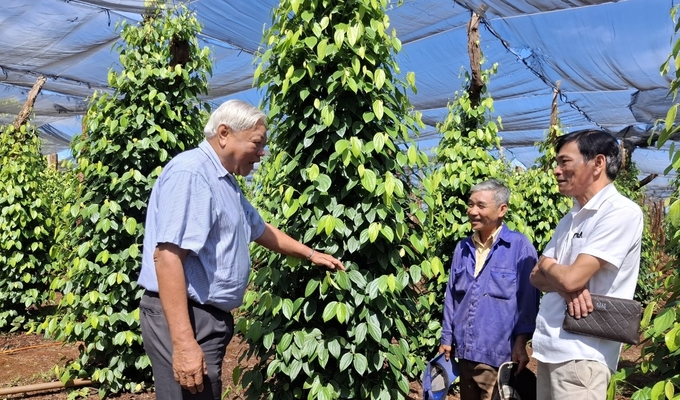June 16, 2025 | 09:46 GMT +7
June 16, 2025 | 09:46 GMT +7
Hotline: 0913.378.918
June 16, 2025 | 09:46 GMT +7
Hotline: 0913.378.918

Farmer Huynh Van Lang tends to his pepper garden, which was planted just over two months ago. Photo: DL.
Resilient in maintaining the garden
In 1984, Mr. Huynh Van Lang (65 years old) left his hometown in Phu Cat District, Binh Dinh Province, to settle in Ia Sa Village, H'bong Commune, Chu Se District. Initially, he did various jobs to support his family. In 1995, Mr. Lang began to cultivate pepper.
At its peak in 2010, Mr. Lang’s family owned a pepper garden with over 2.000 poles. This pepper garden provided the family with a decent income for many years. However, like most other pepper gardens in the region, his garden also suffered from diseases and gradually declined. The difference is that his garden did not die out completely like others did.
“From the very beginning, I followed the guidance of the authorities, cultivating pepper organically, reducing chemical fertilizers and pesticides, primarily using microbial fertilizers, and practicing water conservation”, Mr. Lang explained why his pepper garden did not die completely.
Despite some areas of his pepper plants dying, Mr. Lang remained determined and committed to restoring his garden. Once he had officially overcome the crisis affecting pepper cultivation, he began the process of rebuilding his family’s garden, starting this work four years ago.
“For the areas where the plants died, I dug them out and treated the soil according to the guidelines. Once all conditions were met, I started replanting. First, I purchased carefully screened Vinh Linh seeds. When the new plants developed well, I used cuttings to replant in the next areas”, Mr. Lang shared.
By doing this, in 2023, Mr. Lang was able to plant 200 new pepper poles. Following the same method, from the beginning of 2024 until now, he has added another 600 poles. Currently, his pepper garden, which spans over 1 hectare, has about 1.500 thriving and lush poles.
“With my pepper garden, I always remain committed to organic farming. Although it is a bit more labor-intensive, the benefits are lower costs and safer plants. I still have land available, so I will continue to plant more each year”, Mr. Lang said.
Mr. Hoang Phuoc Binh is a seasoned grower of pepper in the region. He is also one of the few pioneers in seeking and introducing quality pepper seeds and advanced techniques to the Chu Se area. As a result, he has been elected by the local authorities and pepper farmers to serve as the Deputy Chairman of the Chu Se Pepper Association for many years.

Mr. Hoang Phuoc Binh (far left) instructs farmers on how to care for pepper gardens sustainably and organically. Photo: DL.
During the pepper crisis of previous years, Mr. Hoang Phuoc Binh's gardens were not spared, as he noted that one garden is adjacent to another, making disease spread from one to another inevitable. However, this did not discourage him. Recently, he invested 127 million USD to acquire a pepper garden with 10.000 poles over an area of about 7 hectares in Ia H’Lop Commune (Chu Se District).
“Out of the 7 hectares I just bought, over 20% have died due to the disease. The remaining 10.000 poles are currently in the production phase. I personally forecast that the price cycle for pepper will rise for at least the next 10 years, so I am confidently investing in this pepper garden”, Mr. Binh stated.
In An Dien Village, Ia Blang Commune (Chu Se District), people know Mr. Le Hung Huan as someone who dares to "go big" by investing significant amounts of money in agriculture, including rubber, coffee, pepper, and forestry. Specifically for pepper, he currently has 10.000 thriving poles.
“The disease has had some impact, but not much, as my family's pepper garden is relatively independent and employs organic care methods", Mr. Huan said.
In recent years, he has boldly planted thousands of new pepper poles each year, with strong confidence in this price increase cycle.
Mr. Tran Minh Trieu, Deputy Chairman of the Chu Se District People's Committee, stated that the total area of pepper recorded at the end of July 2024 was 1.132 hectares, showing a slight increase compared to previous years. The fact that people are returning to expand pepper cultivation in the district is a positive sign, as it is one of the high-value crops that suits the local climate and soil conditions.
According to Mr. Trieu, the current price of pepper is very stable, ranging from approximately 5.93 USD to 6.78 USD/kg, with the potential to rise even further.
Mr. Tran Minh Trieu, Deputy Chairman of the Chu Se District People's Committee, stated: “We advise people not to rush into planting new crops in large quantities. They should consult with experts to ensure that their gardens develop safely and stably, avoiding disease outbreaks. Everything must be precise, from soil preparation to seed selection and the care process”.
Translated by Phuong Linh

(VAN) The working delegation from the Ministry of Agriculture and Environment conducted an important trip to the Netherlands to strengthen strategic partnerships and sustainable development in the agricultural sector.

(VAN) The letter ‘A Plea from the Ocean’ not only evokes emotion but also awakens the human conscience to the responsibility of protecting life on Earth.

(VAN) The Department of Agriculture in South Africa has announced the country’s first mass vaccination of poultry to prevent local birds from contracting avian influenza.

(VAN) Establishment of the Mekong Delta Regional Agricultural Linkage Center, aiming for a closed value chain, deep processing, trading platforms, and international market connectivity.

(VAN) Gia Lai province has recently recorded 460 rare species of animals and plants, contributing to forest conservation and biodiversity planning in the region.

(VAN) Ms. Caroline Beresford, New Zealand Ambassador to Vietnam, expressed confidence that agricultural cooperation between Vietnam and New Zealand will develop sustainably, be climate-resilient, and promote gender equality.

(VAN) Vietnam reaffirms its commitment to international cooperation in fostering sustainable and responsible fisheries while ensuring resilient livelihoods for small-scale fishing communities.